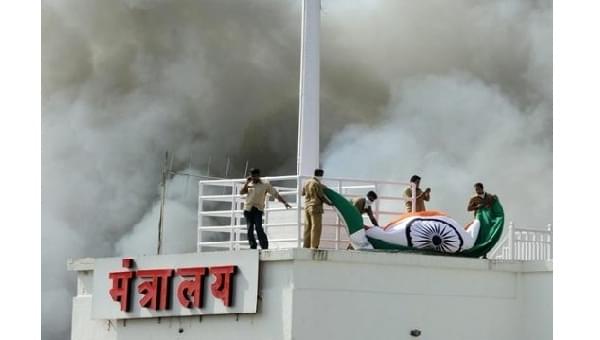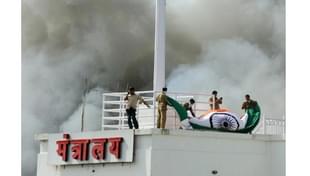Current Affairs
The Season of Fires
Venkatesh K
Jun 26, 2012, 10:36 PM | Updated Apr 29, 2016, 02:19 PM IST
Save & read from anywhere!
Bookmark stories for easy access on any device or the Swarajya app.


Dead men, Charred Files and the cause of Justice
A long time ago, I lived for a short while in South California. It was then that I heard of “the season of fires”. During the hot summers wild fires started spontaneously consuming forests and homes. It turned out later that not all of these fires were really “wild”. Many were later found to be deliberately started by mischievous arsonists and helped along by dry and hot summer winds.
India has been just through a hot and dry summer. The neo-Tughlaqs of Delhi have been oblivious to the flames of stagflation and mis-governance roasting you and me since the last three years. It is no surprise therefore that the first scanty showers of the monsoon sparked wild fires in murky chambers of power at Mumbai and Delhi. It is also no secret what these fires consumed even if the fuel itself was marked “top secret”. We are not strangers to burning paper containing uncomfortable facts. For example, we don’t know what happened to the copies of Shah Commission Report in early 80s. But, it is safe to assume that they made a nice bonfire on a chilly winter day in Delhi.
“Corruption is world-wide phenomenon.” – Indira Gandhi
Shouldn’t our blood boil at such easy cynical manipulation of justice? Dead men tell no tales nor do charred files and hard disks. But can massive cases of corruption, sins of omission and commission be simply burned away?
To be fair to Nehru he never openly sided with naked corruption. Rao Shiv Bahadur Singh, who used to be a minister in his cabinet was convicted in a corruption case and died in jail while serving his sentence. It would be an interesting exercise for the reader to find out more about the illustrious son of this ‘pioneering’ politician. But Indira Gandhi and her son Sanjay changed the whole discourse of the polity and dragged the ethical baseline to the depths of PAtAla. The Indira era represents a watershed when it comes to corruption and political accountability. I can’t think of a single politician of repute who was served just desserts for his crimes across the political spectrum after 70s. This is Indira’s greatest legacy. It is ironical, that the anti-Indira movement threw up charlatans who faithfully imitated her approach to political opportunism, dynastic succession and corruption.
“Sab chor hain.” – Aam Aadmi
The Indian electorate has frequently thrown out incumbent parties out of power both at state and center level. Shouldn’t this be an automatic insurance against corruption and high-handedness? A healthy democracy should automatically enforce curbs on political excess and corruption. After all, evidence of every misdeed is just providing ammunition to political opponents when their eventual turn at political power arrives. But this goes against the facts of recent Indian political history. Opponents have been vilified and called unprintable names while they were in power. However, this fervor rarely translates into visible action such as effective prosecution. At best, we have some vindictive humiliation and political theater like those witnessed in Dravidian politics. The man on the street is so weary of these machinations and back-room deals that he has arrived at the conclusion every Neta is uniformly corrupt or autocratic.
Failure of the Janata experiment
But it was not always like that. We need to go back to the days of emergency to understand how this situation happened. There was a concerted effort to bring Indira, Sanjay and his cronies to book in the initial days of Janata Government. In the aftermath of excesses of emergency Parliament of India passed even laws to institute special courts on 8 May 1979. In the normal course of events,the criminal misuse of power, corruption and accompanying abuse of human rights should have landed Indira, her son and his bunch of thugs behind the bars for a long time. But then, two things went wrong
People yearned for decisive government. The constant infighting among the leaders and indecision of the government proved suicidal. The Janata government fell within a month of passing acts for special courts. Also, the government focused too much on the person of Indira without launching a solid prosecution. This generated sympathy for her and provided political space for her revival.
Decades of single-party government had compromised the bureaucracy and judiciary so badly that all the wrong-doers escaped without a scratch on their backs. Everybody among the elite had something to hide and it was in their collective interest to aid the massive cover-up. Sanjay’s death in in 1980 was a god-sent opportunity to shift the blame to him alone.
Drawing Wrong Lessons
Unfortunately, the failed experiment of Janata has had downstream repercussions. Political leaders and parties across the spectrum have drawn wrong lessons from the experience. This received wisdom has affected all political parties including the offspring of Sangh Parivar, the BJP. In fact, if there is one criminal act the Vajpayee Government can be accused of, it is the deliberate go-slow on the misdeeds of dynastic politics. If rumor mills are to be believed, it went to the extent of bailing out a certain individual from a potentially embarrassing situation. Here are the current rules distilled from the political machinations of post-Indira era.
Rule 1 -It’s OK to be corrupt or high-handed as long as you don’t burn all the bridges.
The corrupt frauds that graduated from the ill-fated Lohia School have internalized this lesson very well. Hence, you don’t find Netas and their offspring trying to hide their wealth and power. Rather, they flaunt it. But you will rarely find them taking risks of complete political isolation.
Rule 2-The threat of prosecution is a political weapon. With actual conviction, you lose it.
This is demonstrated by conduct of both BJP and Congress during their stints in power. Investigation agencies like CBI have been reduced to tools of political arm-twisting and blackmail. Not a single case has been investigated impartially to its logical conclusion.
Rule 3- Prosecution generates sympathy for the prosecuted. It is electorally counter-productive.
Arguably, this is sanest political argument that deters even the non-corrupt from going after the corrupt. Understandably, this is borne out repeated electoral experiences starting from the return of Indira Gandhi to the recent sweep in Andhra by Jagan.
An old tale retold
I shall now recount the tale of another fire that happened a long time ago. I heard this story first from my grandfather and it originates from the grandest tale of them all – the Mahabharata. King Parikshita, the successor of Pandavas was killed by Takshaka, a Naga (serpent). Parikshita’s son Janamejaya vowed revenge on all Nagas. He started a great Yagna with a powerful learned rishi in charge of it. The objective of this Yagna was revenge and vengeance. As the rishi recited the mantras, he would mention the name of a Naga and say Swaha. The mentioned serpent would be plucked by a powerful invisible force and dumped into the burning fire at the Yagna. Takshaka got wind of this Yagna. He ran to King of Devas, Indra for protection.
It is said that he wrapped his coils tightly around the legs of Indra’s throne. When, Takshaka’s turn came, he was nowhere to be found. Janamejaya was livid with rage. The learned Rishi closed his eyes and determined the cause of the problem. He later recited the mantra and said “Sa-indrAya takshakAya SvAhA” (“Let Indra along with Takshaka be offered into this fire”). Immediately, Indra came tumbling down from the heavens along with Takshaka. The rest of the story is moot to illustrate my point. But our ancients knew that the powerful protectors of the culprits need to be brought to account along with the actual perpetrators to serve the cause of real justice.
The Yagna of Justice
In many ways, the constitution of SIT and independent investigation against the Gujarat Chief Minister is a blessing in disguise. Nobody can now say that justice was not done. It is a template that needs to be replicated for every individual holding high offices accused of significant corruption or misuse of power. The frauds that inhabit the corridors in Delhi or other state capitals today should not get away with their crimes. It will be a tragedy if the nation voted for a change and the new governments allowed them to go scot-free.
It is now time to halt and reverse the ethical down slide started during Indira period. Corruption and misuse of power in India started in Delhi and moved downwards. A change for the good too should start from the top. All it takes is a leader with integrity and determination to set an example and tolerate no deviations. With the shadow of next elections in 2014 looming large, we now need to include the demand for justice for the defrauded people of India in the agenda for debate. We should demand that the contenders for the next government go beyond promises of growth and governance. We need commitment to deliver punishment to the defrauders of taxpayers’ money. We should demand justice against the tyrants who violated the rights of innocent people like Rajbala. I hope for a Yagna for justice in 2014 where both Takshakas in Delhi and their protectors are going to be punished. If you promise me that, you are going to get my vote.





